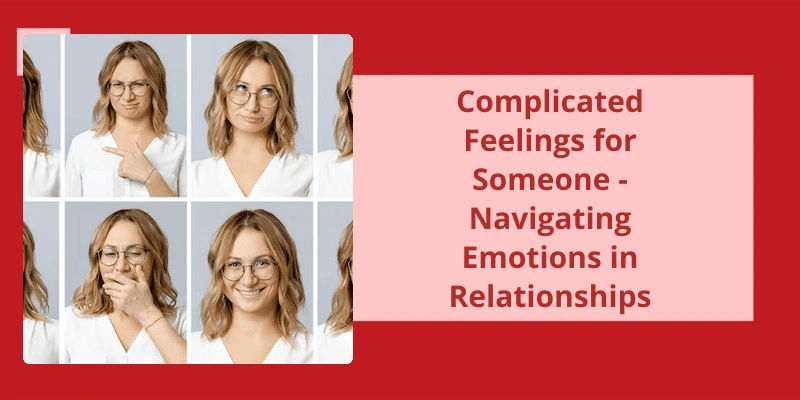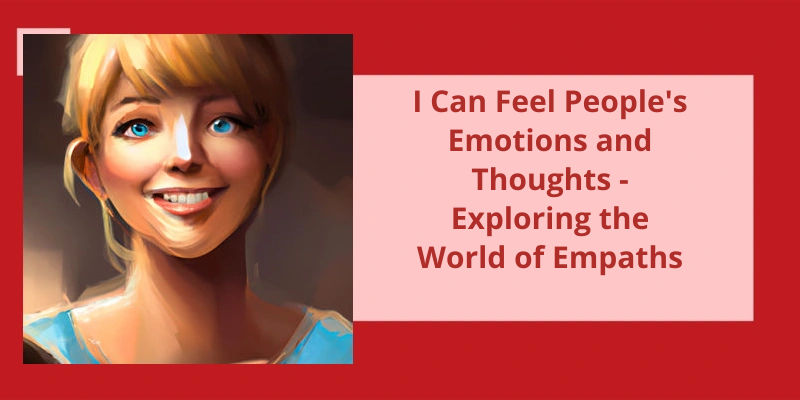It's not uncommon to experience complicated feelings towards someone, where emotions and thoughts can be a mixture of varying degrees. The complexity of these feelings can stem from a variety of factors, such as past experiences, insecurities, or conflicting values. It can be a challenge to navigate these emotions and understand how best to approach the situation. However, it's important to take the time to reflect and process these feelings in order to move forward and make informed decisions. Ultimately, our emotions are an integral part of being human, and it's natural for them to ebb and flow in unpredictable ways.
What Does Complicated Feelings Mean?
Complicated feelings are emotions that are complex in nature and difficult to understand. Many individuals experience these types of emotions when facing challenging situations or circumstances that aren’t easy to resolve. In such moments, individuals tend to feel overwhelmed with a mix of emotions that are difficult to describe, leading to a sense of incomprehension.
For instance, when going through a challenging break up, individuals tend to feel a mix of emotions that are hard to put into words. They may feel anger, sadness, betrayal, confusion, and anxiety, which can make it hard to express their emotions to others effectively. This mixture of emotions can result in complicated feelings, making it challenging to understand and address the complexity of the situation fully.
Furthermore, complicated feelings can also result from internal conflicts, such as wanting to change but feeling stuck or struggling to reconcile personal values with external expectations. This can lead to a feeling of cognitive dissonance as the individual tries to reconcile the conflicting thoughts and emotions. As a result, it can be challenging to express these feelings adequately, leading to a sense of confusion as to how to move forward.
Moreover, many individuals experience complicated feelings when dealing with issues related to their identity, such as sexuality or gender. These situations can be particularly challenging as strong societal norms, and expectations can clash with personal beliefs and desires, leading to feelings of discomfort, anxiety, and confusion. These complex feelings can be challenging to portray accurately, leading to a sense of detachment from oneself and others.
They’re usually difficult to describe because of the complex nature of the situation, the mixed emotions that arise, and the internal conflicts that become apparent. Nonetheless, seeking professional help or confiding in a trusted friend or family member can help to better understand and address complicated feelings.
Navigating a complicated relationship can be a highly difficult and stressful task. It isn’t uncommon to feel overwhelmed, confused, or even emotionally drained when dealing with constant conflict and misunderstandings. It’s crucial to understand the complexities of such relationships and identify ways to address them effectively. In this article, we will delve into what a complicated relationship entails and explore ways to cope with the challenges that come with it.
What Does Love Is Complicated Mean?
Love is a complex emotion that brings different individuals together, each with their unique beliefs, values, and life experiences. When two people with differing personalities and backgrounds come together, it’s easy for misunderstandings to occur. As such, a relationship can become complicated when two people can’t seem to synchronize their thoughts and form a common understanding. Love is complicated in such a scenario because effective communication may be lacking.
A complicated relationship can also arise when one partner isn’t ready for a commitment, while the other is. The difference in expectations can cause tension and disagreements, leading to emotional pain and trauma that may take years to heal. Over time, the couple may become resentful towards each other for holding out on their respective standpoints. In some cases, love can be complicated when two individuals come from different cultures or religions, leading to a clash of values, beliefs, and expectations.
A love is complicated when external factors such as work, family, and finances come into play. For instance, when one partner loses their job or experiences financial problems, it can put a strain on the relationship. In such cases, one or both parties may feel the weight of the responsibilities, leading to stress and emotional instability. They may find themselves irritable and prone to mood swings, further complicating the relationship.
Furthermore, a love that’s complicated may be caused by past relationship trauma or personal experiences. Each partner may come with personal baggage, including trust issues, attachment issues, and commitment issues that can cloud the relationship. They may find themselves unconsciously sabotaging their relationship, leading to constant arguments, disagreements, and misunderstandings.
Love is a complicated emotion, and relationships can be equally challenging. Whatever the reason, it’s essential to address the issues by seeking counseling, working on effective communication and trust-building exercises, and being honest with oneself and the partner.
Signs That Indicate a Love Is Complicated and How to Recognize Them
Love can be complicated and it’s important to recognize the signs. Some common indicators might include constant arguments and misunderstandings, an overwhelming sense of insecurities, and a lack of trust. Recognize these signs and communicate openly with your partner in order to work towards resolving any issues and strengthening your relationship.
Navigating a complicated relationship can be a challenging and emotional experience. It requires a willingness to work through conflicts and a commitment to open and honest communication. In the following section, we will explore some common signs of a complicated relationship and strategies for managing them.
What Is a Complicated Situation in a Relationship?
The root of a complicated relationship often stems from unresolved issues that have been festering for a long time. These issues can range from minor disagreements to significant conflicts that challenge the core of the relationship. Despite the attempts to suppress these problems, they tend to resurface and create further disruptions.
Complicated relationships can also stem from external factors such as financial stress, health issues, or career instability. These elements can put a significant strain on the relationship, leading to a sense of detachment and distance between partners. The fear of instability can also manifest as controlling behaviors or a lack of trust, further complicating the relationship.
In many cases, one partner may feel more invested in the relationship than the other. This imbalance can lead to feelings of neglect, disappointment, and resentment, which only serve to make the relationship more complicated.
Complicated relationships can also be the result of past traumas or experiences that continue to impact the present. Emotional baggage from previous relationships, unresolved family issues, or past traumas can create a toxic cycle that perpetuates negativity and conflict.
It’s crucial to acknowledge that complicated relationships aren’t entirely negative. In fact, they can be an opportunity for growth and introspection. By addressing the issues that make the relationship complicated, couples can strengthen their bonds and learn to communicate more effectively. Through counseling, therapy or some other form of mediation, couples can break down the barriers that stand between them and develop a greater sense of intimacy.
In today’s world, where everything seems to be constantly changing, one thing that’s remained constant is the feeling of infatuation. It’s a common experience that people of all ages have encountered at some point in their lives. But what exactly is infatuation? And how can you tell if you’re experiencing it? In this article, we’ll explore the topic of infatuation in more detail and provide some helpful tips on how to navigate this intense emotion. So, let’s dive in!
What Is It Called When You Have Intense Feelings for Someone?
It’s a common sentiment that comes and goes throughout life, particularly during adolescence and early adulthood. When someone is infatuated with another person, they may become obsessed with their appearance, personality, and behavior. They may feel a sense of euphoria and happiness in the presence of the person they’re infatuated with, and may constantly think about them and imagine romantic relationships that may occur.
However, infatuation isn’t necessarily a healthy or sustainable form of emotional attachment. It can be fleeting and often based on shallow characteristics rather than deeper emotional connections. In fact, many people confuse infatuation with love, but the two aren’t synonymous. While infatuation is often rooted in physical attraction and infatuated individuals may have strong urges to pursue a romantic relationship with the object of their infatuation, love is more of a long-term, supportive emotional bond built on mutual respect, trust, and affection.
Infatuation can also be dangerous if it isn’t handled properly. People who’re infatuated with others often put their object of desire on a pedestal, imagining them to be flawless and perfect. This can lead to disappointment when things don’t turn out as they expected or hoped, or when they realize that the person they’re infatuated with has flaws like everyone else. Worst case, infatuation can lead to stalking or violent behavior if the person becomes obsessed with their object of desire and feels that they’re unable to live without them.
Fortunately, there are ways to manage and cope with infatuation. One option is to take a step back and evaluate the situation objectively, even if this seems difficult or even impossible at first. It may be helpful to talk to trusted friends or family members who can provide emotional support and offer perspective. Additionally, finding hobbies or other activities that one enjoys can help distract from thoughts of infatuation and offer a healthy outlet for emotions and energy.
By being aware of the potential dangers of infatuation and finding constructive ways to cope, individuals can work toward avoiding the negative consequences of this powerful emotion.
Differences Between Infatuation and Love
Infatuation is a strong and intense feeling for someone that’s based purely on physical attraction or a surface level connection. It often fades quickly and can be mistaken for love. Love, on the other hand, is a deep and genuine feeling that’s built on trust, respect, and a deep emotional bond. It takes time to cultivate and develops into a lasting and meaningful connection.
Source: Infatuation vs. Love: 19 Differences + Signs Of Each
However, the concept of love extends beyond just romantic relationships and can encompass a wide range of emotions and connections with others. From familial love to platonic love, this powerful feeling has the ability to shape and influence our lives in countless ways. In the following sections, we will explore the different types of love and how they impact our relationships and overall well-being.
What Do You Call the Feeling of Intense Affection for Another Person?
This affection can take different forms, from platonic to romantic, and sometimes even familial or societal. In essence, it’s an emotion that drives one to care and prioritize the well-being of another person, often at the expense of oneself.
While we can say that love is universal, it’s definition and manifestation can differ between cultures and individuals. It’s influenced by various factors such as upbringing, personal experiences, societal norms, and personal perceptions of romantic relationships. Therefore, what may be considered as an act of love for one person may not be perceived similarly by another.
Furthermore, love isn’t a constant state of being, as it can fluctuate and change over time. It can grow stronger or weaken, and sometimes even fade entirely, despite ones efforts to sustain it. This flux in emotional intensity is why many people perceive love as an elusive and unpredictable emotion.
On the other hand, the absence of love can be a source of immense pain and loneliness. When one feels unloved or rejected, it can lead to feelings of sadness, inadequacy, and even depression. This is why many people strive to find love, believing that it’s the key to happiness and fulfillment in life.
Love is a complex and multifaceted emotion that’s shaped human relationships and culture for centuries. It’s an indispensable part of the human experience that can bring immense joy, but also immense pain. Regardless of it’s complexities and uncertainties, love remains a universal need and desire that motivates us to connect and bond with others.
What Are the Different Types of Love? (e.g., Romantic, Familial, Platonic, Etc.)
Love can come in different forms and doesn’t always have to be romantic. There’s also familial love for our relatives, platonic love for our friends, and self-love for ourselves. Each type of love brings it’s own unique feelings and experiences.
Conclusion
Complicated feelings for someone are normal. Every person experiences mixed emotions at some point in their life. It can be confusing and overwhelming, but it's essential to recognize and acknowledge them. Suppressing or ignoring complicated feelings can lead to emotional distress and further complications. It's crucial to take time to reflect on these emotions, understand their meaning, and try to communicate effectively with the person involved. It's also important to remember that these feelings may change over time and that it's okay to reassess our emotions periodically. Emotions are complex, and it's impossible to have complete control over them. Nonetheless, accepting and managing mixed feelings can lead to a healthier emotional state and better relationships.






